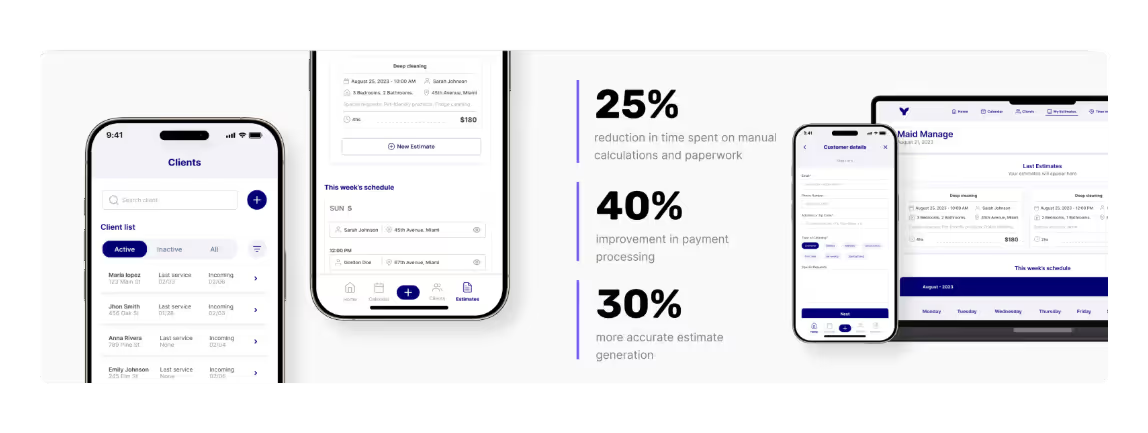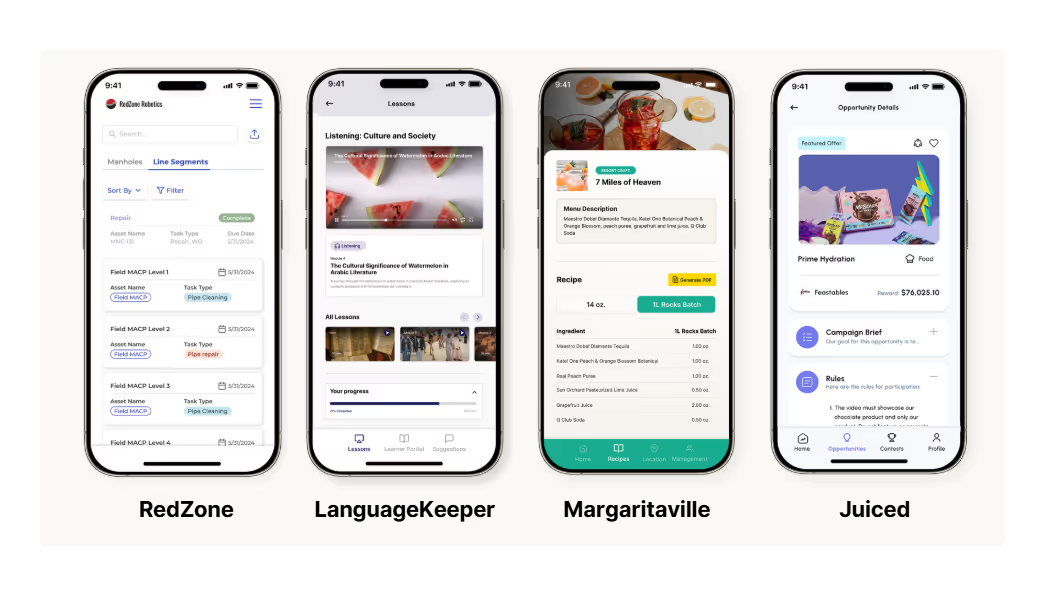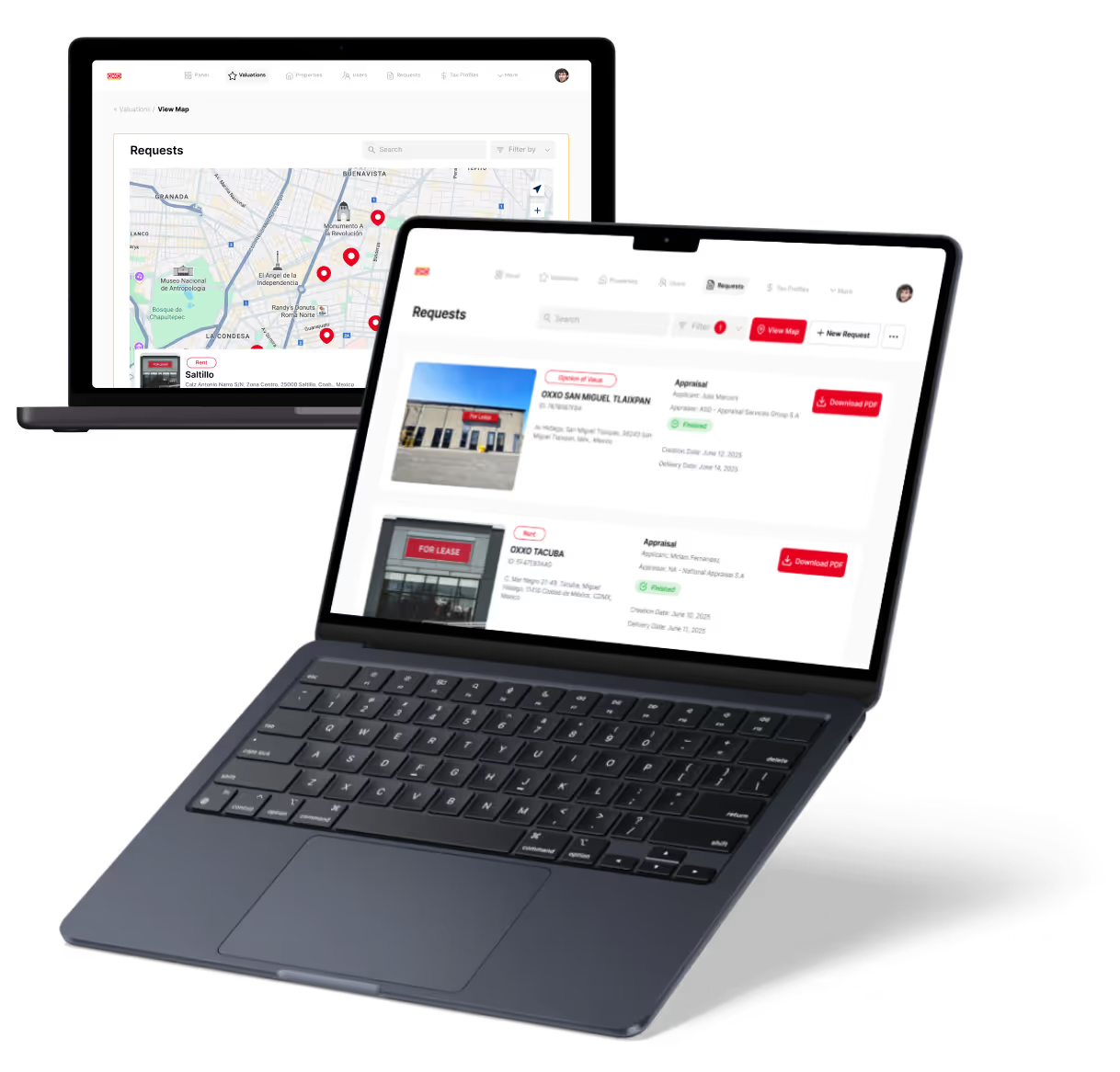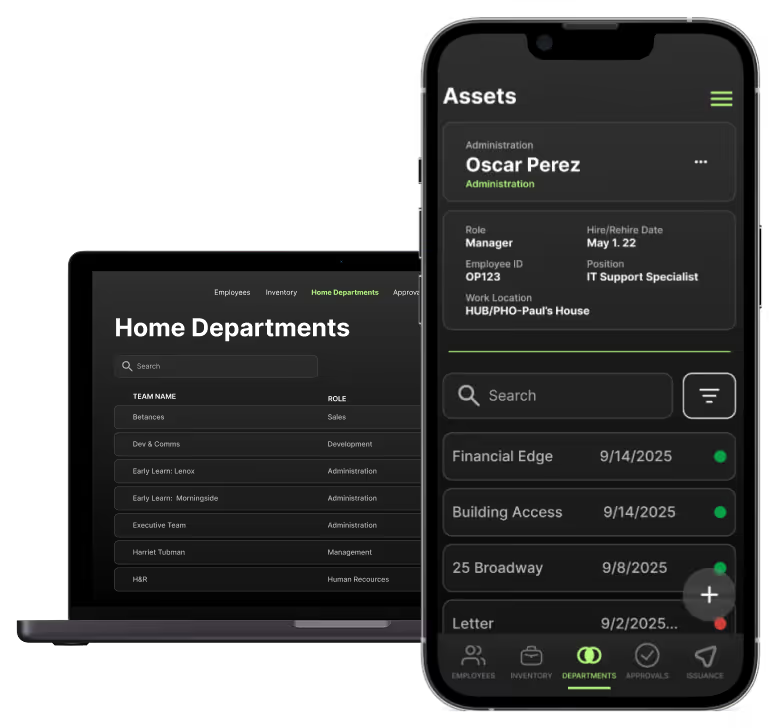Business Mobile App Development Guide
13 min
read
Learn how to develop a business mobile app that boosts sales, improves engagement, and streamlines operations. Complete step-by-step guide included

Think your business doesn’t need a mobile app? Think again.
In 2025, customers expect everything fast, easy, and mobile. Whether they’re shopping, booking a service, or checking an order, they want to do it from their phone. If your business isn’t in their pocket, you might be out of their mind.
The rise in mobile usage means one thing for businesses: adapt or fall behind. A custom mobile app helps you stay ahead and stand out.
Here’s what a mobile app can do for your business:
- Boost sales – Let customers shop or book in seconds, anytime.
- Improve engagement – Stay connected with updates, offers, and messages.
- Streamline tasks – Manage your business from one app, from orders to team schedules.
In short, mobile apps aren’t just helpful, they’re essential.
Partner with LowCode Agency to Build Business Mobile Apps
At LowCode Agency, we've built over 330 mobile apps for businesses across every industry imaginable. We're not just a team of developers; we're your strategic partners who understand that your mobile app needs to drive real business results, not just look pretty.
Our team specializes in transforming business ideas into powerful mobile applications using cutting-edge no-code platforms like FlutterFlow, Bubble, and Glide. This approach means you get enterprise-level functionality without the enterprise-level timeline or budget.
We've helped companies like RedZone revolutionize their field operations with an offline-capable app that increased efficiency by 40%. For GL Hunt construction, we built a comprehensive project management system that eliminated their scheduling chaos and boosted operational efficiency by 40%.
Read more | LowCode Agency's case studies

Your business deserves an app that works as hard as you do. We build apps that don't just serve your customers; they become the engine that drives your entire operation forward.
Read more | Native Mobile App Development
Why No-code & Low-code Are Perfect for Business Mobile Apps
Traditional app development can drain months from your timeline and thousands from your budget before you even know if your idea works. No-code and low-code platforms flip this equation, letting you build, test, and launch faster than ever.
- Fast development without coding: You can have a working mobile app in weeks, not months. No-code platforms like FlutterFlow and Bubble eliminate the need for complex programming, letting you focus on solving business problems instead of wrestling with code.
- Cost-effective for startups and growing businesses: Skip the expensive development team and lengthy contracts. No-code development costs 70% less than traditional coding while delivering the same professional functionality your customers expect.
- Build MVPs and scale quickly: Test your business concept with a fully functional MVP, then iterate based on real user feedback. You can validate your idea in the market without burning through your entire budget upfront.
- Easy integration with existing systems: Connect your new mobile app to your current CRM, payment processors, databases, and business tools. No-code platforms excel at creating seamless workflows between different systems.
- Update and iterate without a dev team: Make changes, add features, and fix issues yourself. You're not locked into expensive maintenance contracts or waiting weeks for simple updates when you control your own app.
What Types of Business Mobile Apps Can You Build?
The beauty of no-code development is that virtually any business process can become a mobile app. Whether you're serving customers directly or streamlining internal operations, there's a mobile solution waiting to transform how you work.
1. Customer-facing apps (e.g., shopping, booking, support)
Create apps that let customers browse products, book appointments, track orders, or get instant support. Think beyond basic functionality, build experiences that keep customers coming back and choosing you over competitors.
Your app becomes the primary way customers interact with your brand, handling everything from initial discovery to post-purchase support in one seamless experience.
Read more | eCommerce Mobile App Development Guide
2. Employee productivity and workflow apps
Transform how your team works with apps that handle time tracking, project management, field reporting, or task coordination. Our RedZone app helped field workers process work orders 40% faster by working offline and syncing automatically when connectivity returned.
These apps eliminate paperwork, reduce errors, and give managers real-time visibility into operations across multiple locations.
Read more | Mobile App Development Guide
3. Inventory and order management apps
Build real-time inventory tracking, automated reordering systems, and streamlined fulfillment processes. Replace spreadsheets and manual tracking with apps that update instantly across your entire operation.
Set automatic alerts for low stock, track products from warehouse to customer, and integrate with suppliers for seamless restocking workflows.
Read more | No-code Mobile App Development Guide
4. CRM and sales tracking apps
Give your sales team mobile access to customer data, lead tracking, and pipeline management. Create apps that capture leads instantly and keep your team connected to opportunities wherever they are.
Include features like automated follow-up reminders, proposal tracking, and commission calculations to boost your team's performance and close rates.
Read more | Custom CRM Development Guide
5. Custom solutions for unique business needs
Every business has specific challenges that off-the-shelf software can't solve. We build tailored solutions like MaidManage's pricing calculator or BuildGenius's construction project management system; apps designed around your exact workflow.
These custom apps address your industry's unique pain points and give you competitive advantages that generic software simply can't provide.
Must-Have Features for Business Mobile Apps
Your business mobile app needs the right features to deliver value from day one. These essential components ensure your app works smoothly for users while giving you the control and insights needed to grow your business.
1. User onboarding and profiles
Create a smooth first impression with guided onboarding that gets users to their "aha moment" quickly. Build comprehensive user profiles that store preferences, purchase history, and personal data.
This foundation enables personalized experiences and helps you understand your customers better while making their interactions with your app feel tailored and relevant.
2. Push notifications and alerts
Keep users engaged with timely, relevant notifications about order updates, appointment reminders, or special offers. Smart push notifications can increase user engagement by up to 88% when used strategically.
Set up automated alerts for critical business events like low inventory, payment confirmations, or urgent customer service requests.
3. Secure login and data protection
Implement robust authentication methods including social login options, two-factor authentication, and biometric access. You can further strengthen account security by integrating a reliable password management tool.
Your customers trust you with sensitive information, so build apps with encryption, secure data storage, and compliance with regulations like GDPR. Security isn't optional, it's what separates professional business apps from amateur projects.
4. Offline access capabilities
Your app should work even when connectivity is spotty or nonexistent. Our RedZone app proved this concept by enabling field workers to complete tasks underground and sync data automatically when signal returned.
Offline functionality ensures your business operations never stop, regardless of network conditions or remote work locations.
5. Analytics dashboard for insights
Track user behavior, feature usage, conversion rates, and business metrics through integrated analytics. Understanding how customers interact with your app helps you make data-driven improvements and identify new revenue opportunities. Build dashboards that show real-time performance metrics your team actually needs to see.
6. Payment gateway integration
Enable seamless transactions with secure payment processing that supports multiple methods including credit cards, digital wallets, and buy-now-pay-later options.
Integrate with platforms like Stripe or PayPal to handle everything from one-time purchases to subscription billing, making it effortless for customers to pay you.
7. Admin panel for content and user management
Create powerful backend controls that let you manage users, update content, process orders, and monitor app performance without technical expertise.
Your admin panel should be intuitive enough for any team member to use, giving you complete control over your app's operation and customer experience.
Read more | How to Choose MVP Features
How to Build Your Business Mobile App
Building a successful business mobile app requires a strategic approach that balances user needs with business objectives. The right process ensures you launch an app that actually drives results, not just looks good in the app store.
1. Planning and requirement gathering
Start by defining your app's core purpose and identifying the specific problems it will solve for your users. Document every feature you think you need, then ruthlessly prioritize based on what will deliver the most value first.
This planning phase should include mapping user journeys, defining success metrics, and establishing a realistic timeline and budget.
Involve key stakeholders early to avoid costly changes later. Interview potential users to validate your assumptions about what they actually want versus what you think they need.
2. Designing user-friendly interfaces
Create wireframes and prototypes that prioritize simplicity and intuitive navigation over flashy features. Your design should guide users toward completing key actions with minimal friction. Focus on consistent visual elements, clear call-to-action buttons, and responsive layouts that work across different screen sizes.
Remember that good design is invisible—users shouldn't have to think about how to use your app. Test your design concepts with real users before moving to development to catch usability issues early.
3. Choosing the right platform (iOS, Android, cross-platform)
Consider your target audience, budget, and timeline when selecting platforms. Cross-platform development with tools like FlutterFlow lets you build once and deploy everywhere, making it ideal for most business apps. If your customers are primarily on one platform or you need specific native features, focusing on iOS or Android first might make sense.
Factor in ongoing maintenance costs and market share in your target regions when making this decision.
Read more | How to Hire the Best No-code Developers
4. Development with no-code
No-code platforms dramatically reduce development time and costs while maintaining professional quality:

- FlutterFlow: Perfect for native mobile apps with complex workflows and offline capabilities. Build apps that work seamlessly on both iOS and Android from a single codebase, with advanced features like real-time databases, custom animations, and API integrations. Ideal for apps requiring sophisticated user interactions and professional mobile experiences.
- Bubble: Ideal for web-based apps with sophisticated databases and user management systems. Create powerful business applications with complex workflows, automated processes, and detailed user permissions. Perfect for CRM systems, marketplaces, and internal business tools that need robust backend functionality and scalability.
- Glide: Excellent for data-driven apps that need rapid deployment and easy updates. Transform spreadsheets into professional mobile apps within hours, making it perfect for inventory management, employee directories, and operational tools. Best choice when you need quick iteration and team members without technical skills to manage content.
Choose your platform based on your specific requirements, not just popularity or personal preference.
5. Testing for quality and security
Implement comprehensive testing that covers functionality, usability, performance, and security across different devices and operating system versions.
Test with real users in realistic scenarios, not just internal team members. Include load testing to ensure your app performs well under actual usage conditions.
Security testing should verify data encryption, authentication systems, and compliance with relevant regulations for your industry.
6. Launching on app stores
Prepare compelling app store listings with clear descriptions, quality screenshots, and proper keywords for discoverability. Follow platform-specific guidelines for iOS App Store and Google Play Store submissions. Plan your launch strategy including soft launches to gather initial feedback before full market release.
Consider coordinating your app store launch with marketing campaigns to maximize initial downloads and reviews.
7. Post-launch maintenance and updates
Monitor app performance, user feedback, and crash reports continuously after launch. Plan regular updates that add new features, fix bugs, and improve performance based on real user data. Maintain compatibility with new operating system versions and devices as they're released.
Establish a feedback loop with users to guide your roadmap and ensure your app continues meeting their evolving needs.
Read more | How to Hire Mobile App Developers
Cost to build a Business Mobile app
The cost to build a business mobile app depends on what you need and how complex the app is.
- Simple apps with user profiles, content pages, and basic forms usually cost $15,000–$25,000 using no-code tools.
- Medium to complex apps with real-time chat, advanced workflows, and databases can cost $20,000–$50,000.
Apart from this, your platform choice plays a big role in your overall budget.
Using cross-platform tools like FlutterFlow is usually more cost-effective than building two separate native apps (one for iOS, one for Android). However, you may have to compromise on some platform-specific features.
Other key factors that affect cost include:
- Number of user roles – More user types often require more logic and screens.
- Custom UI and logic – Unique designs and flows take extra build time.
- System integrations – Connecting to CRMs, ERPs, or third-party tools adds complexity.
- Offline access or sync – Storing and syncing data offline adds to the timeline and budget.
Each feature adds layers to your project. Keeping things simple helps you stay on budget and launch faster.
Read more | How to Hire FlutterFlow Developers
Timeline considerations to build a Business Mobile app
Timelines vary by the complexity of the business mobile app:
- Simple apps: 4–8 weeks
(Example: MaidManage – scheduling & pricing system – built in 8 weeks) - Medium apps: 8–12 weeks
(Example: RedZone – offline sync & API integrations – built in 11 weeks) - Complex apps: 11–15+ weeks
(Example: GL Hunt – construction management – built in 12 weeks)
Reach out to us, we’ll help you estimate the right budget and timeline based on your app idea.
Integration with Existing Business Systems
Your business mobile app shouldn't stand alone. It must connect smoothly with the tools you already use, like CRMs, ERPs, and payment systems, to keep your operations running efficiently.
Modern no-code platforms make this simple. Tools like Bubble and FlutterFlow offer built-in API connectors, so you don’t need complex coding or expensive middleware.
Key integrations to consider:
- CRM, ERP, and business systems – Connect your app to tools like Salesforce, HubSpot, QuickBooks, or any industry-specific software.
Example: GL Hunt’s app syncs with Service Titan, allowing field data to update their CRM automatically. - Custom ERP and field operations – Apps can link with internal ERP tools and platforms like Service Titan for real-time inventory and project tracking.
- Payment gateways – No-code tools support Stripe, PayPal, and Square. These handle security, recurring billing, and global payments without extra setup.
- Third-party services – Use platforms like Zapier or Make to connect your app with email tools, Slack, Google Drive, and analytics tools.
Your app becomes the central hub for your business, helping everything work together and saving time.
Read more | Build a Food Delivery App with No-code
Common Challenges in Business Mobile App Development
Building a mobile app for your business sounds exciting, but it comes with its own set of challenges. If these issues aren’t handled well, they can impact your app’s success.
- Compatibility across devices and platforms
Your app needs to work well on different devices, including Android phones, iPhones, tablets, and across various screen sizes. It also has to run smoothly on both iOS and Android operating systems. Poor compatibility can lead to a broken user experience and bad reviews. - Ensuring robust security and privacy compliance
Business apps often collect personal or payment information. You must protect that data and follow rules like GDPR, HIPAA, or other local regulations. Using secure login methods, encryption, and regular testing helps keep user data safe and builds trust. - Keeping users engaged and retaining them
Getting users to download your app is just the first step. To keep them using it, your app must be easy to use, load fast, and offer real value. Push notifications, rewards, and regular updates help boost engagement and user loyalty.
Addressing these challenges early makes your app stronger and more successful
Read more | Healthcare MVP Guide
Post-Launch Strategies for Success
Launching your app is just the beginning. To grow your user base and keep your app valuable, you need the right strategies after launch.
- App marketing and user acquisition strategies
A great app won’t succeed if no one knows about it. Use social media, app store optimization (ASO), paid ads, and influencer marketing to reach your target audience. Highlight your app’s benefits and solve real user problems to drive installs. - Collecting and analyzing user feedback
After launch, listen to your users. Use in-app surveys, reviews, and analytics tools to understand how people use your app and where they face issues. Real feedback helps you make smart decisions and fix problems early. - Continuous app improvement and feature updates
Update your app regularly to add new features, improve design, and fix bugs. Keeping your app fresh shows users you care and keeps them engaged. Regular updates also help you stay ahead of competitors.
We also help you plan and expand your features post-launch to help you scale, because we’re not just your development team, we’re your strategic technology partners.
Read more | Build a Fitness App with No-code
Conclusion
Business mobile apps are no longer optional, they’re essential for growth, customer engagement, and operational efficiency. With the rise of mobile usage, having an app helps you stay connected to customers and streamline daily tasks.
Starting with a Minimum Viable Product (MVP) is the smart way to test your ideas quickly and get to market faster. It saves time, reduces risk, and helps you build only what your users really need.
But building a great app isn’t just about features, it’s about choosing the right development partner. You need a team that understands your goals, your industry, and the tools that can scale with your business.
Your competitors are already building their mobile advantage. The question isn't whether you need a business mobile app; it's how quickly you can get yours built and launched.
Ready to start? Book a free discovery call with our team and let's turn your mobile app vision into your competitive edge.
Created on
July 11, 2025
. Last updated on
January 9, 2026
.

FAQs
What are the main benefits of having a business mobile app?
How do I choose between native, hybrid, or web apps for my business?
What features should a successful business mobile app include?
How much does it typically cost to develop a business mobile app?
Should I build my business app in-house or hire a development company?
How can I ensure my business mobile app stays secure and protects user data?
















